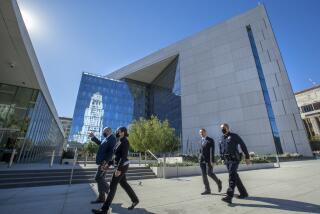Assembly Speaker Proposes Hearings on Rampart Issues
- Share via
State Assembly Speaker Bob Hertzberg has asked Los Angeles County’s public defender to draft a plan for legislative hearings aimed at addressing failures in the criminal justice system brought to light by the unfolding LAPD corruption probe.
“The speaker believes that events we’re seeing in Los Angeles have to be taken very seriously, and that there is a legitimate oversight role for the Legislature to take on these issues,” said Paul Hefner, a spokesman for Hertzberg (D-Sherman Oaks).
Public Defender Michael P. Judge responded to the speaker’s request in an April 27 letter to Hertzberg, raising fundamental questions about the fairness of the county’s criminal justice system. He asked Hertzberg and his legislative colleagues to consider more than a dozen issues that Judge believes may have been factors in scores of tainted convictions stemming from arrests by allegedly rogue officers in the LAPD’s Rampart Division and elsewhere.
The public defender called on the Legislature to conduct a “comprehensive independent assessment” of the criminal justice system “to determine what reforms would be appropriate to ensure that people are fairly treated and the innocent not convicted in the future.”
Any such probe should go beyond the LAPD, Judge said.
“While many entities have focused on the Police Department, none have the authority or mission to examine the entire criminal justice process,” Judge wrote.
Hefner said Hertzberg received the public defender’s letter Monday and was considering its contents.
“The exact scope of legislative inquiry has yet to be determined,” he said.
While Judge is clearly seeking reforms in the wake of the Rampart scandal, his points are made by raising a series of questions for legislators to ponder. Most address issues at the scandal’s core:
* Should police be required to tape-record all interviews with suspects?
* Should all identification procedures, such as photographic lineups, be conducted by officers who do not know the identity of the suspect to prevent any undo influencing of a witness?
* Should judges have wider discretion in sentencing defendants as a way of guarding against innocent people confronted with long mandatory sentences accepting plea deals?
* Would judges be more independent if they had longer terms of office and didn’t have to run for reelection as often?
* Should there be reforms to better regulate the collection of information for gang databases?
A key theme in Judge’s letter is the need to increase a defense attorney’s access to information that reflects on an officer’s credibility. Lawyers representing individuals accused of crimes long have argued that prosecutors are hesitant to turn over complaints and accusations of misconduct against officers who are called to testify in trials.
Judge also is looking for ways to combat the so-called “code of silence” that critics say permeates police departments, including the LAPD. Many officers say that in addition to feeling an allegiance to their partners, they fear coming forward because they will become the objects of their colleagues’ retaliation.
To that end, the public defender questioned whether there should be special whistle-blower protections for officers.
Judge said the fact that none of his proposed discussion items dealt with the role of public defenders should not be interpreted as evidence that he believes his agency is beyond reproach in the unfolding corruption scandal.
“This is sort of an initial cut of what I think an agenda might look like,” Judge said in an interview Monday. “I think it would be fair to examine the role of public defenders . . . and I welcome such scrutiny.”
James A. Bascue, assistant presiding judge of the Superior Court, said there is no doubt that the police corruption scandal demonstrated that the system “broke down.” Hearings such as Hertzberg is weighing might be beneficial, Bascue said. But the onetime prosecutor added that Judge and other defense attorneys have a clear stake in such proceedings: “They’re trying to roll back anti-crime legislation of the past 15 years.”
Judge’s proposal for legislative hearings dovetails with statements made two months ago by LAPD Chief Bernard C. Parks, who has said his agency did not bear sole responsibility for what has become the worst police corruption scandal in city history.
After unveiling his department’s self-critical report on the internal roots of the police corruption, Parks called on other members of the criminal justice system to conduct similar reviews.
Dist. Atty. Gil Garcetti called the proposed hearings “a marvelous idea. . . . This is something that not only affects Los Angeles, but I dare say most every jurisdiction in the state.”
Garcetti added that such hearings should solicit the input of every member of the criminal justice system, including jurors.
“We need to say, ‘What more can we do to make sure that the innocent are protected and the guilty are held accountable?’ ”
Police Commission President Gerald L. Chaleff supported the idea.
“The criminal justice system should always be reevaluating itself and evaluating the impact legislative changes and court decisions have on the system.”
The toll of the Rampart scandal has been considerable and seems to mount every day.
Prosecutors have successfully moved to overturn at least 67 criminal convictions because of the involvement of allegedly corrupt officers. Several people have been released from prison, including a young man who was serving a 23-year sentence for allegedly attacking police.
More than 30 LAPD officers have either been relieved of duty, suspended or fired or have quit in the wake of the scandal. More than 70 are under investigation for either committing police crimes and misconduct or knowing about such activity and failing to report it.
The allegations under investigation include officers planting evidence, intimidating witnesses, perjuring themselves and covering up unjustified shootings.
More to Read
Get the L.A. Times Politics newsletter
Deeply reported insights into legislation, politics and policy from Sacramento, Washington and beyond. In your inbox three times per week.
You may occasionally receive promotional content from the Los Angeles Times.











